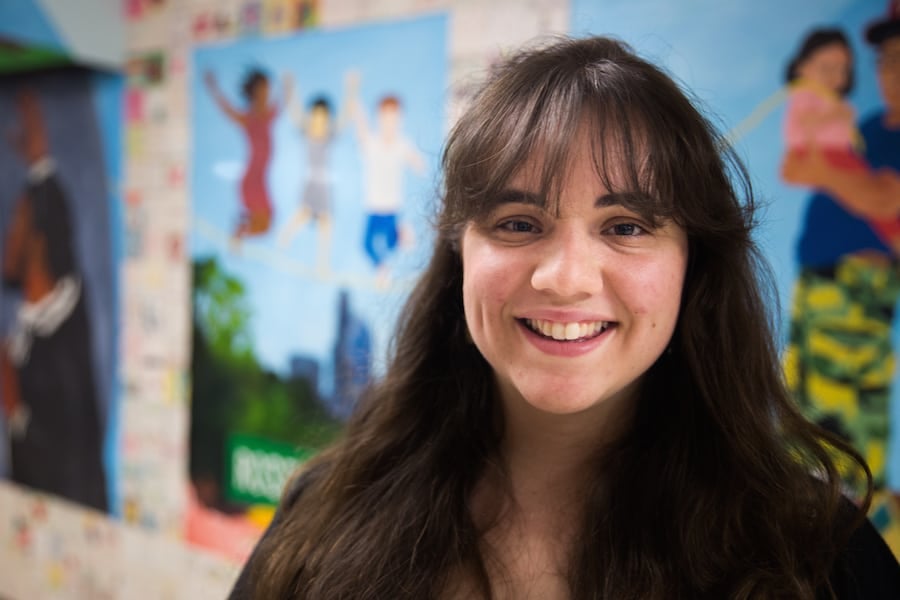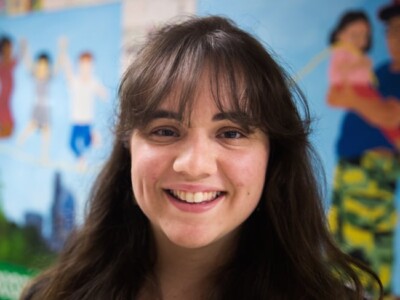When the Spanish Field Immersion course launched at the School of Social Work in the fall of 2016, master’s student Ana Hernandez jumped at the opportunity.
Hernandez, who is in the clinical track and in the dual degree program with Latin American studies, grew up speaking Spanish at home but wanted the chance to develop her language skills in a professional setting, in preparation for working with Spanish-speaking populations after graduating.

Social work students who, like Hernandez, are already proficient in Spanish had for a long time wanted more opportunities to use that skill when working in the community and to incorporate the language into their program of study. Spanish Field Immersion is one of two recent master’s level courses available for students interested in bilingual social work–the other is Spanish for Social Workers.
As part of the course, students spend ten hours a week at an agency in the community for a total of 120 hours over the course of the semester. In that immersion placement, students do most of their work in Spanish and they meet weekly for supervision in the same language. Once a week, the students reconvene in the classroom with the professor to discuss the issues that come up in their immersion placement and how they relate to social work theories at the macro and micro level.
Tanya Voss, assistant dean for field education, collaborated with the course’s professor, Alma Mena, to find appropriate immersion placements in the community
“We wanted to be able to expand both our services to the community and the educational opportunities to our students,” Voss says. “The program grew out of our commitment to contribute in meaningful ways to the workforce development. We need more Spanish-speaking social workers.”
Hernandez was placed at the YWCA Greater Austin and felt that she truly contributed to embodying their motto: “Empowering Women. Eliminating Racism.”
As part of her field immersion duties, she held individual counseling sessions with two clients at the agency’s headquarters in Austin and also led group sessions at the T. Don Hutto Residential Center. As the YWCA has limited physical space, it has sought to reach more individuals in need by creating groups in other locations — like the group at the Hutto detention center, which houses asylum-seeking women coming from Mexico and Central America through the southern Texas border.
During the group sessions at Hutto, Hernandez taught coping, breathing, and grounding skills to help the women during their time in detention.
“We provided them a space to forget about the detention center, where they can laugh, cry, and share their stories in a safe, therapeutic environment,” she says.
Hernandez appreciates the incredible hands-on learning opportunity in her field immersion placement and how it helped her improve her social work skills.
“I was able to go into the detention center and provide mental health services to these women and children who have had very traumatic experiences. Ameliorating a little bit of what they’ve experienced was an incredible learning opportunity.”
Even more valuable was the opportunity to work with a Spanish-speaking supervisor at the YMCA and conduct counseling sessions in Spanish — the biggest benefit of the class.
“Having a supervisor that is fluent in Spanish… there was no replacement for that. It is invaluable to do client work in Spanish and discuss it with your supervisor in the same language. ”
Bilingual social workers are vital to Texas, according to Hernandez, and the cycle to produce them starts in school:
“Students who to go through Spanish immersion field placements become comfortable speaking Spanish when they are social workers. Then they can become Spanish-speaking supervisors at their agencies, where then they lead the next generation of Spanish-speaking social workers, which then continues the cycle.”
Because of her commitment to being a Spanish-speaking social worker, in 2015 Hernandez was accepted into the St. David’s Foundation Bilingual Social Work Scholar Program. The School of Social Work established the program in 2012 with funding from the St. David’s Foundation to meet the growing demand for bilingual health and mental health professionals in Texas.
Hernandez has continued to work with the YWCA through the spring semester and is starting to look ahead to her 540-hour final field placement — one of the last stepping stones before graduating
“As long as I’m at a placement where I can do bilingual social work with the immigrant community in Austin, I’ll be happy,” she says.
By Shelby Knowles. Posted February 14, 2017.


